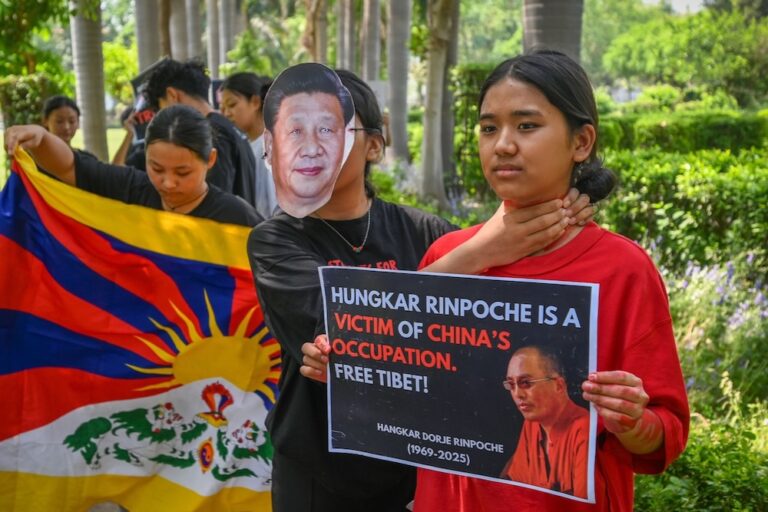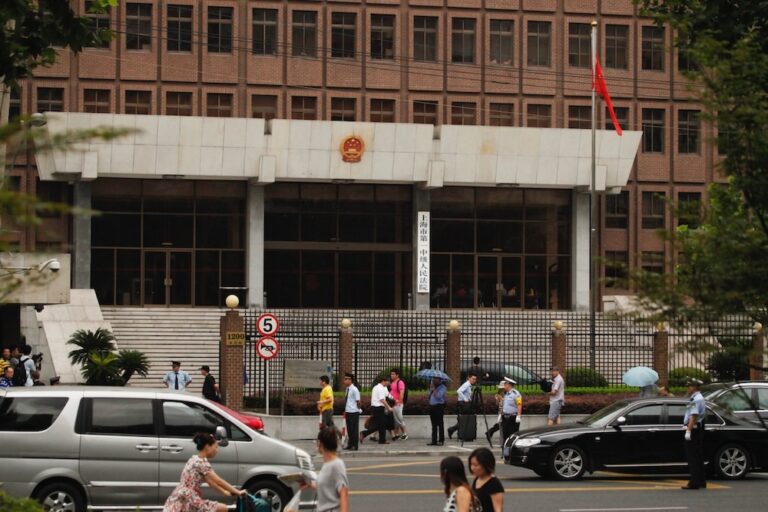PEN International highlights several cases of Uyghur writers and scholars who received long prison terms, which reflect the worsening censorship and repression targeting Uyghurs and other minorities in China's Xinjiang region.
This statement was originally published on pen-international.org on 10 May 2021.
PEN International is alarmed by recent reports of severe prison sentences being handed down to Uyghur writers and intellectuals, many of whom had already been extrajudicially detained for several years in Xinjiang’s notorious re-education camps. We continue our call for an immediate end to the atrocious repression of Uyghurs and other minorities in Xinjiang carried out by the government of the People’s Republic of China (PRC).
Among those detained is literary translator and academic principal, Ahmetjan Juma, who was reportedly sentenced in 2019 to 14 years’ imprisonment according to a social media post made by his brother on 1 May 2021. The sentencing took place two years after he was initially detained in a re-education camp in 2017 for possessing a book that was prohibited by the authorities. His brother, who works as Deputy Director of Radio Free Asia’s (RFA) Uyghur Service, believes that Ahmetjan Juma’s punitive prison sentence is a form of punishment for his work at RFA highlighting human rights abuses in Xinjiang.
Recent reports have also emerged about the sentencing of Uyghur writer, Ahtam Omer, to 20 years’ imprisonment on separatism charges after he was initially detained on 12 March 2017 for allegedly sending money to his nephew while he was studying in Egypt. The author of much-loved books, including Child of the Eagle and Polluted Lake, Ahtam Omer was also a member of the China Writers’ Association and had previously worked as a professional writer for the Kashgar Prefectural Literary and Artistic Association, according to a profile by Uyghur PEN. Despite Child of the Eagle having been published as part of the prestigious China Ethnicities Literature journal, in 2020 the book was reportedly taken off shelves and burned by the authorities as part of a campaign to vilify and destroy Uyghur literary works, many of which were previously given government approval for publication.
The suppression of human rights in Xinjiang is a colossal tragedy, encompassing the entire range of human rights. The arbitrariness, the secrecy, the unjustness, and the pitiless cruelty of the state has been consistent. The lack of access to information only compounds the tragedy. We wish we could have expressed our outrage earlier. Ahmetjan Juma and Ahtam Omer should not have been jailed at all; and yet they have spent months under incarceration. Such perverse sentencing must stop, as should all the repression the Uyghurs are facing, said Salil Tripathi, Chair of PEN International’s Writers in Prison Committee.
The targeting of Uyghur writers and other intellectuals forms part of the Chinese government’s broader efforts to dislocate the Uyghur population from their cultural identity and heritage through overwhelming levels of censorship and repression. Included among up to 1.8 million Uyghurs and other minorities detained in Xinjiang’s extrajudicial re-education camps are hundreds of writers, poets, translators, scholars and public intellectuals, who together represent the living embodiment of the Uyghur cultural identity.
In an attempt to conceal the true extent of the atrocities being committed, the authorities have imposed a climate of almost complete secrecy surrounding those detained. As a result, many of the detainees have no means of communication with the outside world, making it impossible for family and friends to ascertain their wellbeing while also exposing them to greater risk of abuse. A recent example is Haji Mirzahid Kerimi, a renowned Uyghur poet who was among 14 staff members at the Kashgar Publishing House in Xinjiang who were detained for publishing books that were later deemed to be ‘problematic’. Sentenced to 11 years’ imprisonment at 80 years old, reports have recently emerged that he died on 9 January 2021 while serving his sentence after sustaining injuries from an incident where he reportedly “jumped and fell”. Another example is the presumed detention of the world renowned scholar Rahile Dawut, a leading expert on Uyghur folklore at Xinjiang University, who disappeared without a trace while travelling from Xinjiang to Beijing in December 2017.
More recently, in response to the growing international condemnation of the atrocities being committed in Xinjiang, the PRC government has sought to apply a veneer of legality to its extrajudicial system of mass arbitrary detention by holding secret trials and handing out heavy prison sentences to Uyghur intellectuals. This includes the detention of acclaimed writer Perhat Tursun, who is now reportedly serving a 16-year prison sentence following his initial enforced disappearance by the authorities in 2018.
PEN International calls on the PRC government to immediately dismantle its re-education camp system and unconditionally release all those detained on groundless charges of extremism and separatism. Only when the authorities live up to the principles and values enumerated in China’s constitution and China’s international human rights obligations will the PRC government begin to work towards addressing the devastating damage it has inflicted on some of its most vulnerable populations.



